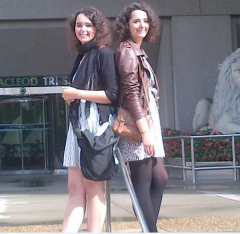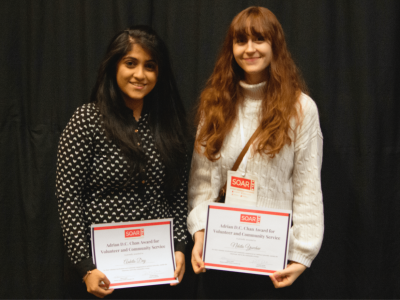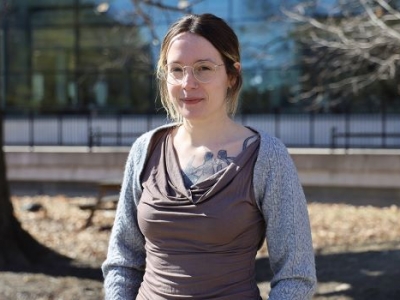 Julie Kingston will be the first person in her immediate family to graduate with a master’s degree – by 10 seconds. Her identical twin Natalie will also be graduating on June 11th with the same degree, a Master of Arts in Public Administration (MAPA) and the same specialization – public management.
Julie Kingston will be the first person in her immediate family to graduate with a master’s degree – by 10 seconds. Her identical twin Natalie will also be graduating on June 11th with the same degree, a Master of Arts in Public Administration (MAPA) and the same specialization – public management.
The twins, who live in Kanata, also graduated together from Carleton with the same undergraduate degree, a Bachelor of Public Affairs and Policy Management (BPAPM).
“Natalie and I, from a young age, always pursued what interested us as individuals even if it meant doing the same thing,” says Julie. “I think it’s that we were so confident in who we were that doing the same thing didn’t matter.”
As both twins had a long term goal of working for the Federal Government, they chose to pursue a graduate degree in public administration.
They applied to several relevant MA programs across Canada. Says Natalie: “We selected Carleton’s MAPA program because it offered one of the largest range of electives. It also had an extremely generous funding package and excellent professors.” Julie concurs: “It had the best location for finding work placements, a very generous funding package, excellent professors, and a broad range of public management/public policy courses that complemented (rather than overlapped excessively with) our undergraduate degree.”
Natalie was extremely interested in the co-op option. “During my undergraduate degree, I was hired as a co-op student by a Strategic Policy group in Public Works and Government Services Canada’s Real Property Branch. After the summer term, I continued to work part time for the group while pursuing my studies…During my Master’s program I did an additional co-op with a client service group within the Branch. The types of work experience I gained and the types of people I worked with maintained my interest in working for the public sector.”
Both gained additional experience while working on coursework projects For example, in the Policy Analysis and Contemporary Governance course, Natalie says she gained experience in providing recommendations on complex issues and policies. While writing a paper on the benefits of alcohol interlock programs and flaws of alcohol interlock programs. she concluded that to be more effective, interlock programs should be paired with programs that deal with the root causes of participants’ alcohol abuse problems and that increasing the severity of alternatives to participating in the interlock programs could increase participation rates in interlock programs.
Reflecting on her time at Carleton, Julie shares that she admired all of her professors for their skill and passion but noted that it wasn’t always easy for their professors to tell them apart. “Some of our professors joked about having us wear name tags,” says Julie: “A few professors instinctively knew. Others tried to learn but I can’t say that Natalie and I made it easy on them. We tried to sit in certain seats or dress a certain way. For example, one person would style their hair so that it was curly, the other straight, but we’d sometimes forget.”
Julie is now working as a junior policy analyst for the Department of Employment and Social Development Canada. Natalie has just finished a Federal Student Work Experience Program term as a research analyst with Public Works and Government Services Canada and has begun a casual position with the Indian Residential Schools Adjudication Secretariat.
Now that school is over, they are both looking forward to having more free time to spend together. Julie notes that the main thing that they love to do when they have time is travel. She adds that they have gone across North America together (e.g., Chicago, California, Alaska) and hopefully, in a few years, can start to see Europe together as well.
Tuesday, June 3, 2014 in Convocation, News, Programs
Share: Twitter, Facebook




